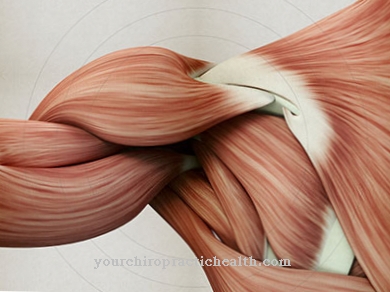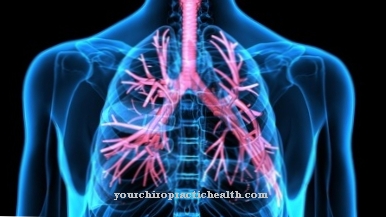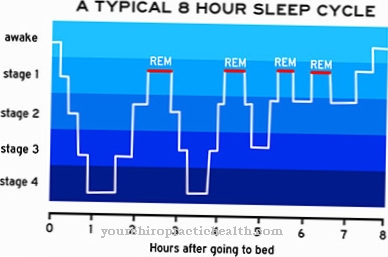As Neuropathy denotes a number of diseases of the peripheral nervous system. But disorders of the central nervous system such as vegetative dysfunction also fall under this designation. Sometimes neuropathy is the result of other diseases such as diabetes or the consumption of neurotoxic substances such as alcohol or medication.
What is neuropathy?

© Sebastian Kaulitzki - stock.adobe.com
On the etiology of the primary neuropathies: The primary ones emanating from the nerves themselves Neuropathies are usually inherited. The primary neuropathies include hereditary motor-sensitive neuropathies (affect the motor system), hereditary sensory neuropathies, hereditary sensory-autonomic neuropathy (disorders of the sense of pain and temperature), hereditary motor neuropathies and the hereditary neuropathies with a tendency to pressure lesions.
On the etiology of secondary neuropathies: These include inflammatory diseases, autoimmunological diseases, e.g. Guillain-Barré syndrome (the immune system attacks the body, especially the nerves), metabolic diseases (metabolic disorders of the nervous system) and the consequences of taking neurotoxic substances (such as benzene, phenol, drugs, alcohol or chemotherapeutic agents) .
causes
The causes: The nervous system is divided into the central nervous system (brain and spinal cord) and the peripheral nervous system (these are the nerves from the spinal cord to the corresponding organs to be supplied).
The main task of the nerves is to transmit impulses that the brain sends out in a motorized manner - e.g. as movement of a muscle or to transmit information and sensations to the brain. Nerve damage such as neuropathy leads to disorders of these functions. The causes are manifold and range from circulatory disorders to inflammation and poisoning to diseased genetic material or metabolic disorders.
Diabetes can also trigger neuropathy: Due to the higher blood sugar level, the walls of the veins, which enrich the peripheral nerves in the arms and legs with blood, become thicker - this leads to circulatory disorders in the nerve fibers. Further causes of neuropathies are hyperthyroidism and hypothyroidism, liver diseases, acromegaly, neuritis and malnutrition.
Symptoms, ailments & signs
The symptoms that neuropathies cause depend on the underlying disease and the affected nerves. Symptoms often change in nature, intensity, and frequency. Peripheral neuropathies primarily lead to nerve damage in the arms, legs, hands and feet.
The nerve pain is very stressful for those affected. It is described as stinging, burning, tingling, shooting in or radiating. It tends to occur spontaneously at rest and often diminishes with activity. Sensitivity disorders are perceived as annoying. The skin feels furry to numb.
Recognition of touch and temperatures as well as the sense of touch can be impaired. Some patients report muscle weakness or cramps. Sometimes paralysis occurs, which leads to unsteady gait and balance disorders.
Autonomic neuropathies cause symptoms in the case of body functions that cannot be consciously controlled. Circulation and heart rhythm changes can occur. The functions of the entire digestive system can be disturbed. Symptoms of the urinary and genital organs are also possible. Heavy perspiration leads to dry, cracked skin in the area of the feet and lower legs. Sometimes water retention occurs.
The primary neuropathies are congenital and inherited. They are rare and show up before the age of twenty. Possible signs include abnormal movement or sensation and pain. Disturbances of the internal organs, as well as the absence of pain sensations, are less common.
Diagnosis & course
Diagnosis and course: Following the anamnesis, the neurologist conducts a clinical examination. The neurological status of a patient is ascertained. This is followed by a detailed anamnesis.
The reflexes, coordination, motor skills and sensitivity are tested. An electromyography, in which an examination of the muscles is carried out, can be used to find out more about the peripheral paralysis.
With this method you can differentiate between muscle wasting caused by nerves and your own muscle diseases. Electronurography can also be revealing. The course of the disease and the duration of the disease are different and difficult to predict.
Complications
Like the causes of neuropathy, the effects can vary. Often, fixing the underlying cause is enough to restore nerve function. However, that doesn't always work. This is the case when the nerve cells have already been irreversibly destroyed. In these cases, discomfort and numbness persist.
However, since neuropathy can affect any organ, the type of complications that occur often depends on the organ affected. In addition to cardiac arrhythmias, stool or urinary incontinence can also occur as complications. A known complication of neuropathy is the so-called diabetic foot. In the case of diabetic foot, the diabetic polyneuropathy is in the foreground.
It affects the supply of the foot, so that massive wound healing problems arise there with the slightest injury. Initially, the polyneuropathy leads to muscle paralysis in the foot muscles, which causes incorrect posture of the foot. Due to the incorrect loading, the bony basis of the metatarsus constantly sinks. First, larger layers of the cornea develop, which over time lead to tears in the skin.
These wounds, however, are often not noticed by those affected because they do not feel any pain due to the restricted nerve functions. Wounds that heal poorly can then occur unnoticed, which in the long term sometimes even lead to necrosis of the foot. In extreme cases, the affected foot may even have to be amputated.
When should you go to the doctor?
If there is pain in the limbs and muscles, calf cramps, or abnormal sensations, the cause may be neuropathy. Medical advice is needed if these symptoms persist for a long time or if they get worse quickly. If no clear cause can be assigned to the complaints, a doctor must be consulted. Twitching or abnormal sensations indicate advanced neuropathy and should be clarified quickly. If in doubt, the sick person must be taken to a hospital for a physical examination and the condition diagnosed and treated.
Risk groups include people with chronic infections, kidney damage or long-term nutritional deficiencies. Diabetes mellitus patients as well as people who suffer from a tumor or who have come into contact with a neurotoxin must also speak to the responsible doctor if they have mentioned symptoms. In addition to the family doctor, various internists, dermatologists, nephrologists and other specialists treat neuropathy. Serious illnesses always require inpatient therapy in a specialist clinic.
Treatment & Therapy
For the therapy of neuropathies: Depending on the pattern of involvement, a distinction is made between mononeuropathy, polyneuropathy, autonomic neuropathy, mononeuritis multiplex and radical neuropathies. And the therapy depends on the infestation pattern, the underlying disease.
In congenital Neuropathies only symptomatic therapy is possible. If a bacterial infection is the cause, antibiotic therapy is given. Toxic poisons can be cured if they are left out. Naturopathic, homeopathic and alternative medical methods such as magnetic field therapy or acupuncture can also help. Is the neuropathy metabolic-related, e.g. Due to diabetes, controlling blood sugar levels through medication may help.
Advanced neuropathies can usually no longer be completely reversed, but can be suppressed well with painkillers, which are also effective against depression or epilepsy. Smoking and alcohol should be avoided.
If paralysis with muscle wasting occurs, physiotherapy with light strength training is a treatment method. Misalignments of the joints should be avoided. Careful massage and breathing exercises can also go a long way.
At an advanced stage of the disease, patients should consult their doctor about which aids, such as orthopedic shoes, walkers or wheelchairs, should be used. In severe cases, patients may become bedridden. Then a nursing service is to be commissioned.
You can find your medication here
➔ Medicines for paresthesia and circulatory disordersOutlook & forecast
The prognosis of neuropathy depends on the causes of the health disorder. In the case of a congenital disease, there is no prospect of a cure. In medical care, the individually pronounced symptoms are treated as best as possible. The best long-term success is achieved with the earliest possible start of therapy. Nevertheless, there is a relapse phenomenon as soon as the initiated medical measures are interrupted.
If there is a bacterial cause of the neuropathy, the pathogens are tried to prevent them from spreading and killed by administering drugs. The organism can then independently transport and excrete the germs. There is a gradual improvement in the health situation until freedom from symptoms can be documented.
In many patients, an alleviation of the symptoms can also be observed through the use of alternative healing methods. In the field of naturopathic treatment there are various approaches that have proven themselves in the past. However, this has to be assessed on the basis of the overall situation.
If the causes of the disorder can be traced back to an irregularity in the metabolism, drug treatment can lead to a significant improvement in health. In addition, the lifestyle should be optimized so that complaints are reduced. If the neuropathy is very pronounced, the person affected needs daily care and support in coping with everyday life.
prevention
Prophylaxis: What preventive effects are moderate exercise, a healthy diet and the adjustment of blood sugar, if this is necessary due to a pathological change. Especially when a family disposition is recognizable, one should be careful with neurotoxins such as alcohol and medication. Diabetes patients need to be particularly careful and check their blood sugar levels immediately.
Aftercare
In most cases, the person affected by neuropathy has very few and usually only very limited follow-up measures available. For this reason, the person affected should consult a doctor at an early stage to prevent and limit the occurrence of other complications. The earlier a doctor is contacted, the better the further course of the disease will usually be.
Therefore, a doctor should be consulted at the first symptoms and signs of this disease. Most patients with this disease are dependent on the intake of various medications in order to permanently relieve the symptoms. The person concerned should always pay attention to a regular intake and also to the prescribed dosage of the medication.
In the event of side effects or if anything is unclear, a doctor should be consulted first. Physiotherapy measures are often necessary to alleviate the symptoms. Many of the exercises can be done in your own home, which could speed up the treatment. If possible, the person affected should refrain from alcohol and smoking. Life expectancy may also be limited due to the neuropathy.
You can do that yourself
In the case of nerve damage, the causes are extremely different. The most effective form of self-help here is a mindful, healthy lifestyle. Everything that literally "gets on your nerves" should be avoided. This includes, in particular, smoking and excessive consumption of alcohol.
There are alternatives to drug pain therapy. Impressive results were achieved with the electrical, transcutaneous stimulation of the nerves (TENS). Blood sugar and blood pressure values should be checked regularly, as optimal settings are extremely important in polyneuropathy. It may also be possible to reduce this naturally through a diet. Diabetics are advised to have professional foot care carried out regularly - and to examine their feet themselves daily with a small mirror. Anyone who suffers from the "many nerve disease" should wear good shoes that are safe to walk, have a good footbed and protect against injuries.
Sports that put stress on the feet such as running, jogging or playing tennis are not advisable. More suitable sports for all patients with neuropathy are cycling or swimming. Because of the prevalence of neuropathy, there are many support groups where patients can find advice and support.



























